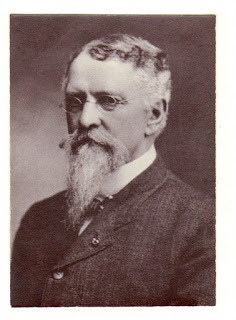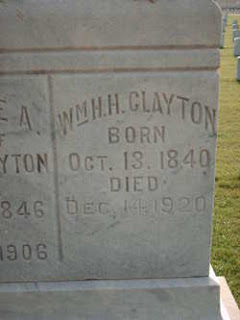Two of Fort Smith's most notable historic figures were Judge Isaac Parker and W. H. H. Clayton.
William
Henry Harrison Clayton, usually referred to as W. H. H. Clayton, was an
American lawyer and judge in post-Civil War Arkansas and Indian Territory
Oklahoma. He was the United States Attorney for the United States District
Court for the Western District of Arkansas and for fourteen years was the chief
prosecutor in the court of Isaac Parker, known as the “Hanging Judge.”
Clayton
and his twin brother were born in Bethel Township, Pennsylvania. The Clayton
family was descended from the original Quaker settlers of Pennsylvania. Clayton
was raised on his father's farm and received his early education at the Village
Green Seminary. In 1862, he raised a company in Delaware County—Company H of
the 124th Regiment, Pennsylvania Volunteers which served a nine month
enlistment. He served as a lieutenant in Company H, while his twin brother
served as the first sergeant. His regiment fought in several of the well-known
battles of the Civil War. Just over one month after the discharge of the 124th,
General Lee brought his army to Pennsylvania. Governor Curtin declared another
state of emergency, and Clayton and most of the members of the 124th were
hastily assembled into the newly formed 29th Emergency Regiment, Pennsylvania
Volunteer Militia. They fought at Gettysburg, among other battles. After his
service, he took a position as a teacher of military tactics and other subjects
at the Village Green Seminary in his home county.
 |
| W.H.H. Clayton |
W.
H. H. Clayton followed his brother Powell to Pine Bluff, Arkansas, and, with
John M. Clayton, the three brothers purchased 2,000 acres plantation on the
Arkansas River. He married a southern woman, Florence Barnes. In 1868, Clayton
sold his shares of the land and moved to Huntsville in Madison County to study
law under Judge Stephenson. In 1868, Powell Clayton was elected Governor of Arkansas,
and W. H. H. Clayton, while studying law, was appointed circuit superintendent
of public instruction for the Seventh Judicial Circuit of Arkansas and helped
organize an education system for the newly freed slaves.
In
1871, W. H. H. Clayton was admitted to the bar and was appointed prosecuting
attorney for the First Judicial Circuit of Arkansas. In 1873, Governor Elisha
Baxter appointed him a judge of the same Circuit Court.
In
1875, William Henry Harrison Clayton was appointed United States Attorney for
the Western District of Arkansas by President Ulysses S. Grant. At that time,
the United States District Court for the Western District of Arkansas had
jurisdiction over one-third of the state of Arkansas and all of the Indian
Territory to the west that eventually became the state of Oklahoma. This area
comprised over 74,000 square miles (190,000 km2) of some of the
most wild and violent lands in the postbellum United States. W. H. H. Clayton
moved to Fort Smith when he took the U.S. Attorney position. Fort Smith was a
bustling community full of brothels, saloons and outlaws, just across the river
from Indian Territory.
William
Clayton realized a strong judge would be necessary to bring law and order to
the region. He knew of a strong judge in Isaac Parker. However, Judge Parker
had been appointed Chief Justice of Utah Territory and confirmed by the US
Senate. With the help of President Grant and US Senator Powell Clayton, former
governor of Arkansas, W. H. H. Clayton was able to undo that appointment and
redirect Judge Parker to Fort Smith. He was appointed US Attorney by four
different presidents during his career.
William
Clayton later served as Chief Justice of Indian Territory. During his 10 years
as a federal judge, Clayton had issued important decisions defining Indian
rights, which had long-term effects on the future history of Oklahoma. He was
instrumental in achieving statehood for Oklahoma and together with Territorial
Governor Frank Frantz, carried the Oklahoma Constitution to President Teddy
Roosevelt after the state was admitted to the Union in 1907. Governor Frantz
and Judge Clayton both lost their territorial positions when Oklahoma became a
state.
 In
1907, President Theodore Roosevelt appointed Clayton to serve on the Oklahoma
Districting and Canvassing Board. Clayton had also been a delegate selected to
write the new constitution for the State of Oklahoma. After his retirement from
the federal bench, Clayton resumed the practice of law in McAlester with his
son. Clayton died in McAlester on December 14, 1920, and is buried in the
national cemetery at Fort Smith.
In
1907, President Theodore Roosevelt appointed Clayton to serve on the Oklahoma
Districting and Canvassing Board. Clayton had also been a delegate selected to
write the new constitution for the State of Oklahoma. After his retirement from
the federal bench, Clayton resumed the practice of law in McAlester with his
son. Clayton died in McAlester on December 14, 1920, and is buried in the
national cemetery at Fort Smith.
Sources:
Wikipediahttp://www.encyclopediaofarkansas.net/encyclopedia/entry-detail.aspx?entryID=7354
Zina Abbott recently published two books as part of the multi-author series, LOCKETS & LACE.
The first, the prequel to the series, is titled The Bavarian Jeweler.

The other, book 3 in the Lockets & Lace series, is Otto's Offer.





This is the first article I have ever read involving twin brothers. I thought "the hanging judge" was a fictional character. I guess I learned a few things today.
ReplyDeleteCould you give the titles of the books in the series in order? I would be very interested to know.
Wonderful article, Zina.
Zina,
ReplyDeleteInteresting history. W.H.H. Clayton was certainly a "mover and a shaker" in his time.
So amazing to read about historical figures such as W.H.H.Clayton who led quite a demanding life. Great read, Zina!
ReplyDeleteWHH Clayton doesn't appear to be a hanging judge but, rather, a man of foresight and innovation. Great account, Zina!
ReplyDelete